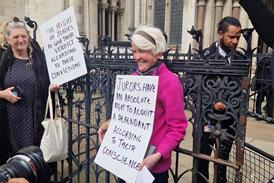Decisions filed recently with the Law Society (which may be subject to appeal)
Richard Andrew Seddon and Gowlings Solicitors Limited
Application 12236-2021
Hearing 22 November 2021
Reasons 2 December 2021
The Solicitors Disciplinary Tribunal ordered that the first respondent (admitted 1992) and the second respondent should each pay a fine of £12,000.
The first respondent, while in practice as a director at the second respondent, and the second respondent, had failed to perform undertakings given to Brabners LLP and to a lender in a letter from the firm dated 18 November 2016 within the agreed timescale, thereby breaching principle 6 of the SRA Principles 2011 and failing to achieve outcome 11.2 of the SRA Code of Conduct 2011.
The parties had invited the SDT to deal with the allegations against the respondents in accordance with a statement of agreed facts and outcome.
The SDT had reviewed all the material before it and was satisfied on the balance of probabilities that the respondents’ admissions had been properly made.
Both respondents were responsible for the undertakings given. The first respondent appreciated the importance of complying with any undertakings given. The failure to comply with the undertakings at all, or late compliance, had caused harm to the lender and to the reputation of the profession.
The SDT assessed the conduct as falling within its indicative fine band level 3, as the misconduct was assessed as more serious.
A fine in the sum of £12,000 for each respondent accurately reflected the seriousness of the misconduct.
The respondents were ordered to pay costs in the sum of £5,250, on the basis of joint and several liability.
Sandra Campbell
Application 12228-2021
Admitted 1998
Hearing 9 November 2021
Reasons 24 November 2021
The SDT ordered that the respondent should be struck off the roll.
Between 5 August 2020 and 20 July 2021, the respondent had misappropriated £164,264 from client A; and between 4 May 2020 and 20 July 2021, she had misappropriated £17,000 from client B, thereby breaching principles 2, 4, 5 and 7 of the SRA Principles 2019, rule 4.2 of the Code of Conduct for Solicitors, and rule 5.1 of the Solicitors Accounts Rules 2019.
She had misled client A and client B by representing that the sums would be or were being paid, when they were not; and had misled the applicant by representing that the firm was in funds to pay client A, when it was not, thereby breaching principles 2, 4 and 5 and rule 1.4 of the code.
She had misled the court, by failing to state that client A’s funds had already been dissipated and giving the impression that the funds would be repaid, thereby breaching principles 1, 2, 4 and 5 and rule 1.4 of the code.
The respondent was fully responsible for her actions, with a high degree of culpability.
Her conduct had caused direct financial loss to clients A and B. The sums involved were very significant, amounting to a combined total of over £180,000. The distress and inconvenience caused was very substantial.
The respondent’s clients had been cynically misled. The significant reputational harm to the profession of a solicitor misappropriating client money and misleading clients, the regulator and the court, was something which would have been obvious to the respondent.
Her conduct was an inexcusable and egregious departure from the standards required of all solicitors. It was an abysmal example of dishonest behaviour towards clients, the court and the regulator.
The findings against the respondent, including dishonesty, required that the appropriate sanction was strike-off from the roll.
The respondent was ordered to pay costs of £25,115.
Sam Themis
Application 12212-2021
Admitted 2003
Hearing 25 October 2021
Reasons 22 November 2021
The SDT ordered that the respondent should be struck off the roll.
While in practice as the owner and sole equity member at ST Solicitors LLP, the respondent failed to ensure that the firm protected client C’s money, thereby breaching principles 4, 6 and 10 of the SRA Principles 2011, and rule 1.2 of the SRA Accounts Rules 2011. He had acted recklessly.
He had caused or allowed unallocated client to office transfers, resulting in a cash shortage on the client account, namely on 5 June 2019, a minimum cash shortage of £5,000. He had thereby breached principles 2, 4, 6 and 10 of the SRA Principles 2011, and rule 20.1 of the SRA Accounts Rules 2011. He had acted dishonestly.
He had failed to ensure that the firm was closed in an orderly manner and clients’ interests were maintained, thereby breaching principles 2, 4, 6 and 10 and rules 7.1 and 7.2 of the rules.
He had failed to maintain books of accounts, including client ledgers, client cashbooks, client liabilities and client account reconciliations, thereby breaching principles 4, 6 and 10, and rules 1.2(e) 1.2(f), 29.1, 29.2, 29.4, 29.12(a), 29.12(b) and 29.12(c) of the rules.
He had failed to cooperate with the SRA’s forensic inspection, thereby breaching principle 7 and failing to achieve outcome 10.6 of the SRA Code of Conduct.
The respondent’s level of culpability was high as he had been in complete control of the firm. He was the COLP, COFA and MLRO for the firm, and had compounded his responsibility and culpability by excluding his accountants from financial processes.
As to the harm which he had caused, there was a proven cash shortage on client account, and his actions had put other client funds at risk. His failure to effect an orderly closure of the firm had impacted directly and seriously upon clients. He had also caused loss of money to the Compensation Fund, which had impacted on his professional colleagues.
A finding of dishonesty would almost invariably lead to striking off, save in exceptional circumstances. The respondent had not tendered any exceptional circumstances, and none had been found. In the circumstances, strike-off was the only appropriate and proportionate sanction to protect the public and the reputation of the profession.
The respondent was ordered to pay costs of £23,379.
James Michael Gregson
Application 12221-2021
Admitted 2004
Hearing 3 November 2021
Reasons 30 November 2021
The SDT ordered that the respondent should be suspended from practice as a solicitor for an indefinite period from 3 November 2021.
The respondent had been convicted of common assault, having used a weapon, a pan, to assault A, aged 71, in her own home.
He had been sentenced to 18 weeks’ imprisonment, suspended for 12 months. A restraining order was also imposed, preventing him from contacting A directly or indirectly or entering her home for one year. He was ordered to pay compensation, costs and a £115 surcharge to fund victim services.
The respondent had thereby breached principles 2 and 6 of the SRA Principles 2011.
He had failed to report his conviction to the SRA in circumstances where he had an obligation to comply with his legal and regulatory obligations and deal with his regulators in an open, timely and cooperative manner, thereby breaching principle 7 of the 2011 Principles, and failing to achieve outcome 10.3 of the Solicitors Code of Conduct 2011.
He had failed to respond to requests for information from the SRA during the investigation into his conviction, thereby breaching paragraphs 7.3 and 7.4 of the Code of Conduct 2019 for Solicitors, RELs and RFLs.
The respondent had caused direct and significant harm to A as well as another elderly person who resided with them. The extent of the harm was marked by the fact that a restraining order had been made against the respondent as part of the criminal sentence imposed upon him, and that the restraining order had been extended to prevent him from communicating with or having any contact with the other elderly person who continued to reside with A.
The matter had been reported in the local press and it had expressly stated that the respondent was a solicitor. That had caused significant and severe harm to the profession.
The overarching public interest, namely the protection of the public from harm and the upholding of standards within the profession and maintenance of public confidence in it, could properly be met by the imposition of an indefinite period of suspension. The onus was therefore on the respondent, in time, to seek help and apply for the lifting of his suspension if he was able to demonstrate that he no longer posed a threat to the public and the profession in the future.
The respondent was ordered to pay costs of £2,543.
Obiter Legal Limited and Kuldip Singh Lall
The SRA has intervened into Obiter Legal Limited and into the practice of Kuldip Singh Lall at the firm, of 121B High Street, West Bromwich, West Midlands B70 6NY. This decision was made by the Adjudication Panel.
The grounds of intervention into Kuldip Singh Lall were:
- Kuldip Singh Lall had failed to comply with the SRA Principles 2019 and the SRA Accounts Rules 2019 (paragraph 1(1)(c) of Schedule 1– Part I to the Solicitors Act 1974).
- It was necessary to intervene to protect the interests of clients or former clients and any beneficiaries of any trust of which Kuldip Singh Lall is or was a trustee (paragraph1(1)(m) of Schedule 1 – Part I to the Solicitors Act 1974).
The grounds of intervention into Obiter Legal Limited were:
- Kuldip Singh Lall as a manager of the firm, and the firm itself, had failed to comply with the SRA Principles 2019 and the SRA Accounts Rules 2019 which are rules applicable to them both by virtue of section 9 of the Administration of Justice Act 1985 (paragraph 32(1)(a) of Schedule 2 to that act).
- It was necessary to intervene to protect the interests of clients or former clients, the interests of the beneficiaries of any trust of which the firm is or was a trustee, or the interests of the beneficiaries of any trust of which a person who is or was a manager or employee of the firm is or was a trustee in that person’s capacity as a manager or employee (paragraph 32(1)(e) of Schedule 2 to the Administration of Justice Act 1985).
John Owen of Gordons LLP, 1 New Augustus Street, Bradford BD1 5LL (tel: 0113 227 2116; email: intervention@gordonsllp.com) has been appointed as the Society’s agent.


















![David Lester (senior partner at Blythe Liggins), Darryl Barnes, Jagdeep Sandher (head of dispute resolution at Blythe Liggins)[4]](https://d1d8vslyhr7rdg.cloudfront.net/Pictures/274x183/4/2/8/116428_davidlesterseniorpartneratblytheligginsdarrylbarnesjagdeepsandherheadofdisputeresolutionatblytheliggins4_981603_crop.jpg)







